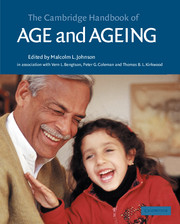28 results
Contributors
-
-
- Book:
- The Cambridge Dictionary of Philosophy
- Published online:
- 05 August 2015
- Print publication:
- 27 April 2015, pp ix-xxx
-
- Chapter
- Export citation
Aging in Canada: Social Perspectives. Victor W. Marshall (Editor), Second Edition, Markham, Ontario: Fitzhenry and Whiteside, 1987, 613 pages, $24.95.
-
- Journal:
- Canadian Journal on Aging / La Revue canadienne du vieillissement / Volume 7 / Issue 3 / Fall/Automne 1988
- Published online by Cambridge University Press:
- 29 November 2010, pp. 233-236
-
- Article
- Export citation
PART SIX - THE AGEING OF SOCIETIES
-
- Book:
- The Cambridge Handbook of Age and Ageing
- Published online:
- 05 June 2016
- Print publication:
- 01 December 2005, pp 491-560
-
- Chapter
- Export citation

The Cambridge Handbook of Age and Ageing
-
- Published online:
- 05 June 2016
- Print publication:
- 01 December 2005
The Cambridge Handbook of Age and Ageing - Title page
-
-
- Book:
- The Cambridge Handbook of Age and Ageing
- Published online:
- 05 June 2016
- Print publication:
- 01 December 2005, pp iii-iii
-
- Chapter
- Export citation
PART ONE - INTRODUCTION AND OVERVIEW
-
- Book:
- The Cambridge Handbook of Age and Ageing
- Published online:
- 05 June 2016
- Print publication:
- 01 December 2005, pp 1-82
-
- Chapter
- Export citation
The Cambridge Handbook of Age and Ageing - Half title page
-
- Book:
- The Cambridge Handbook of Age and Ageing
- Published online:
- 05 June 2016
- Print publication:
- 01 December 2005, pp i-ii
-
- Chapter
- Export citation
PART THREE - The ageing mind
-
- Book:
- The Cambridge Handbook of Age and Ageing
- Published online:
- 05 June 2016
- Print publication:
- 01 December 2005, pp 179-272
-
- Chapter
- Export citation
PART TWO - THE AGEING BODY
-
- Book:
- The Cambridge Handbook of Age and Ageing
- Published online:
- 05 June 2016
- Print publication:
- 01 December 2005, pp 83-178
-
- Chapter
- Export citation
PART SEVEN - Policies and Provisions for older people
-
- Book:
- The Cambridge Handbook of Age and Ageing
- Published online:
- 05 June 2016
- Print publication:
- 01 December 2005, pp 561-681
-
- Chapter
- Export citation
CHAPTER 7.1 - The Social Construction of Old Age as a Problem
- from PART SEVEN - Policies and Provisions for older people
-
-
- Book:
- The Cambridge Handbook of Age and Ageing
- Published online:
- 05 June 2016
- Print publication:
- 01 December 2005, pp 563-571
-
- Chapter
- Export citation
CHAPTER 1.1 - The Problem of Theory in Gerontology Today
- from PART ONE - INTRODUCTION AND OVERVIEW
-
-
- Book:
- The Cambridge Handbook of Age and Ageing
- Published online:
- 05 June 2016
- Print publication:
- 01 December 2005, pp 3-20
-
- Chapter
- Export citation
Contributors
-
-
- Book:
- The Cambridge Handbook of Age and Ageing
- Published online:
- 05 June 2016
- Print publication:
- 01 December 2005, pp xii-xvi
-
- Chapter
- Export citation
PART FOUR - The Ageing Self
-
- Book:
- The Cambridge Handbook of Age and Ageing
- Published online:
- 05 June 2016
- Print publication:
- 01 December 2005, pp 273-400
-
- Chapter
- Export citation
Contents
-
- Book:
- The Cambridge Handbook of Age and Ageing
- Published online:
- 05 June 2016
- Print publication:
- 01 December 2005, pp vii-xi
-
- Chapter
- Export citation
Dedication
-
- Book:
- The Cambridge Handbook of Age and Ageing
- Published online:
- 05 June 2016
- Print publication:
- 01 December 2005, pp v-vi
-
- Chapter
- Export citation
Index
-
- Book:
- The Cambridge Handbook of Age and Ageing
- Published online:
- 05 June 2016
- Print publication:
- 01 December 2005, pp 682-744
-
- Chapter
- Export citation
PART FIVE - The Ageing of Relationships
-
- Book:
- The Cambridge Handbook of Age and Ageing
- Published online:
- 05 June 2016
- Print publication:
- 01 December 2005, pp 401-490
-
- Chapter
- Export citation
Foreword
-
- Book:
- The Cambridge Handbook of Age and Ageing
- Published online:
- 05 June 2016
- Print publication:
- 01 December 2005, pp xvii-xx
-
- Chapter
- Export citation
General Editor’s Preface
-
- Book:
- The Cambridge Handbook of Age and Ageing
- Published online:
- 05 June 2016
- Print publication:
- 01 December 2005, pp xxi-xxvi
-
- Chapter
- Export citation

